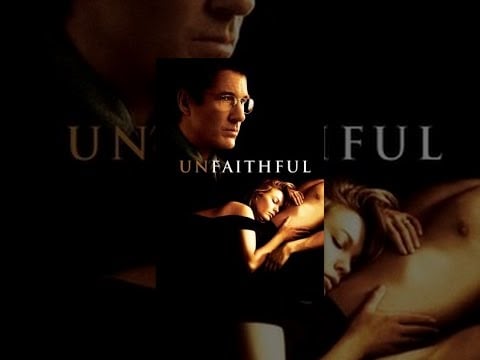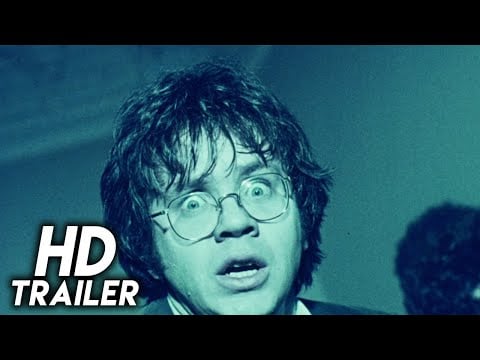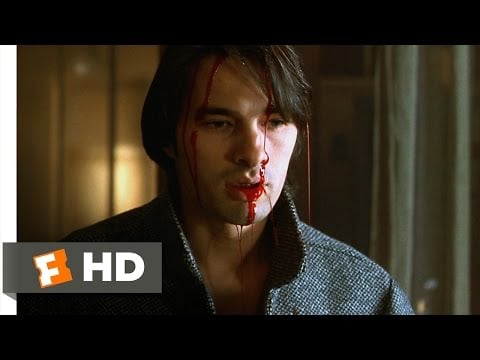Adrian Lyne’s “Unfaithful” (2002) opens with a ludicrous windstorm, in which the happy but bored Connie (Diane Lane) is literally knocked off her feet by gusts of wind and “saved” by a handsome stud named Paul Martel (Olivier Martinez).
Connie is taken aback by Martel’s kindness, his stacks of antique books and mostly by what a gorgeous hunk he is. Her repeated encounters with him initially are a how-far-can-I-go self-dare, an erotic curiosity that isn’t fulfilled.
Of course, if the married and formerly responsible Connie had done the right thing, we wouldn’t have a movie. So, we have Connie taking the train across town to have an afternoon tryst with Martel, while her too busy and lame husband Edward (Richard Gere) watches over their son and, to Edward’s credit, he picks up on Connie’s deception almost immediately
Adrian Lyne’s work has been firmly planted in the mainstream but, even if Lyne is considered more commercial than deserving of auteur status, there’s no denying his impact on cinema. In fact, if you look at his body of work, one could even suggest that he’s an important filmmaker with distinct themes and visuals that define his work.
Lyne’s “Flashdance” (1983), perhaps the definitive MTV-era dance musical, has a rich visual palette that far exceeds how dopey the plot is. While a mild defense should be made of Lyne’s once ridiculed “Nine and a Half Weeks” (1986), his subsequent and definitive work, “Fatal Attraction” (1987), deserves its classic status, as its even deeper and more terrifying than most remember.
Lyne’s masterpiece, as far as I’m concerned, is “Jacob’s Ladder” (1990), a devastating psychological thriller that, unlike so many horror films that get by on jump scares, is almost too much to bear and is backed by the strength of its tremendous cast and Bruce Joel Ruben’s hall-of-fame screenplay.
Lyne directed the hell out of “Fatal Attraction” and “Jacob’s Ladder,” both of which stand tall over his oddly popular and tacky “Indecent Proposal” (1993), which is to “Fatal Attraction” what “Jade” (1995) is to “Basic Instinct” (1992).
After taking on the impossible chore of making the second attempt to adapt Nabakov’s “Lolita” (1997) into a film, the experience made the filmmaker slow down; the admirable, deeply upsetting and not definitive “Lolita” was never released in the U.S. (a problem for a film that expensive that needed the additional box office).
Lyne followed it up with “Unfaithful” (2002) which, until the announcement of “Deep Water,” many thought was his final movie. “Unfaithful” (2002), played like his final mic drop on the whole erotic thriller genre that he helped define.
RELATED: This ‘Affair’ Shows Far More Than Sex
It’s all in the details, a Lyne specialty – swirling dishwater, coffee being poured, the rocking of water in a basin in a train restroom, a warm bubble bath – all of this is presented as Lyne’s cinema of the senses, in service of a tawdry Lifetime TV movie.
I love most of Lyne’s movies but “Unfaithful” wants to be “Fatal Attraction” but has so much more in common with “Indecent Proposal.” The gimmicky pull of that movie was, “would you prostitute your wife for $ 1 million?” However, when your wife is Demi Moore, married to a goofy and unstable character played by Woody Harrelson and the one shelling out the million bucks is a suave, uncannily nice billionaire played by Robert Redford, the con is on us, not them.
Or, as I recall my dentist once telling me while he cleaned my teeth, “For a million dollars, I’d sleep with Redford!”
“Unfaithful” is on this level of overheated sex fantasy, with its only truly edgy touch in the first act being how the sex scenes between Lane and Martinez appear more like sexual assaults than consensual encounters. The ickiness of these scenes is the only moral ground the film has to stand on, though it never references any of these sequences once they pass.
Lane is excellent, conveying her character’s vulnerability but unwillingness to break her addiction. Gere is surprisingly effective playing a wimp and a really lame movie Dad.
The Ben Affleck and Ana de Armas thriller marks Lyne’s first film in 20 years https://t.co/XLl9U4Mz3m
— GQ Magazine (@GQMagazine) March 19, 2022
Martinez isn’t playing a real role but an idea, which is a big problem. As the third wheel who shakes up a pure marital union, Martinez isn’t playing a villain, an innocent or even a layered figure, as the movie never decides on who he’s supposed to be. A line of dialog lazily gives his life outside the tryst some context, but it arrives too late.
Gere sells armored cars and Martinez deals in antique books – neither actor seems a match for their character’s profession. Note how Martinez lazily hands Lane his first edition copy of Jack London’s “White Fang” (!).
Not in a million years would a serious book dealer carelessly hand a mint edition book like that to a stranger – if anything, I hoped Lane would stuff it in her coat and run off with such a valuable treasure! Also, Martinez is aces at sex but can’t cook, to a comical degree.
Why?
At one point, Lane and Martinez have sex in an art house movie theater during a showing of Tati’s “Monsieur Hulot.” Mon Dieu! Those monsters!
Fun Fact: A couple had sex in a nearly empty theater last fall, two aisles in front of me, during a showing of “The Night House.” I didn’t leave, because I had a deadline to review the film, and it was a late showing, so no one was in the theater to intervene if I reported the horny couple. It may be just a coincidence that I hated “The Night House,” but I digress.
A very cinematic touch: Oranges spill, a “Godfather”-like indication disaster is about to strike (at least that pesky windstorm doesn’t return). Lyne’s love for old timey elevators makes a return as well, in a moment that clearly wanted to (but doesn’t) recreate a moment from “Fatal Attraction.”
When Martinez breaks up with Lane, he utters a real crusher: “Fine, go back to your suburban carpool!”
RELATED: Sexy Movie Romances … From the Female Perspective
A close second hall of fame howler comes when Martinez seduces Lane with this line: “Your eyes are so beautiful, you should never close them, even when you’re asleep.” Has this pickup line ever worked in the history of mankind?
Gere’s character takes the focus of the second act, and this is where the film finally catches fire. Or, you could say the film kicks into first-Gere (taps microphone) …first Gere…is this thing on?
“Unfaithful” is better than Alan J. Pakula’s “Consenting Adults” (1992) but what it really wants to do is recapture the provocative, what-would-you-do moral thriller that was “Fatal Attraction.” Despite the strong midsection, the unintentionally funny start and the dreary, melodramatic third act make a roaring flame completely fizzle out.
This is almost a good movie.
I won’t describe it, let alone spoil it, but the last scene doesn’t work as a conclusion or the ambiguous puzzle it means to be. In fact, it’s the kind of what-does-that-even-mean bafflement I found in the last scene of “Cabin Boy” (1994).
I’m not being complementary.
The post Did ‘Unfaithful’ Send Adrian Lyne to the Hollywood Bench? appeared first on Hollywood in Toto.


